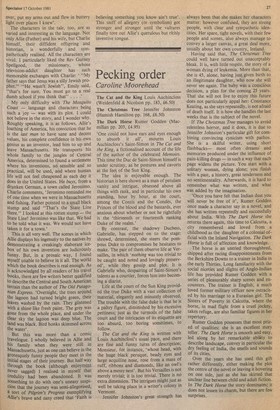Pecking order
Caroline Moorehead
The Cat and the King Louis Auchincloss (Weidenfeld & Nicolson pp. 183, £6.50) The Christmas Tree Jennifer Johnston (Hamish Hamilton pp. 168, £6.50) The Dark Horse Rumer Godden (Macmillan pp. 203, £4.95) 'One could not have ears and eyes enough to absorb it all', mourns Louis Auchincloss's Saint-Simon in The Cat and the King, a fictionalised account of the life of the author of the celebrated Memoirs. This time the Duc de Saint-Simon himself is under scrutiny, as he postures and cavorts at the feet of the Sun King.
The idea is enjoyable enough. The historian is here shown as a man of petulant vanity and intrigue, obsessed above all things with rank, and in particular his own standing, hour by hour, at the court, among the Contis and the Condes, the Princes of the blood and the bastards, ever anxious about whether or not he rightfully is the 'thirteenth or fourteenth ranking Duke of the realm.'
By contrast, the shadowy Duchess, Gabrielle, has stepped on to the stage: shrewd, determined, she steers the pompous Duke to compromises he hesitates to make. The pair of them observe life at Versailles, in which 'nothing was too trivial to be caught and noted and lovingly preserved', while they gossip and plot. It is Gabrielle who, despairing of Saint-Simon's talents as a courtier, forces him into becoming a diarist.
Life at the court of the Sun King provided the true Duke with a vast collection of material, elegantly and minutely observed. The trouble with the false duke is that he is a paltry figure, diminished by his excessive pettiness; just as the turmoils of the false court and the intricacies of its etiquette are too absurd, too boring sometimes, to follow.
The Cat and the King is written with Louis Auchincloss's usual pace, and there are fine and funny turns of description; Monsieur, for instance, 'whose head, with the huge black peruque, beady eyes and large acquiline nose, rose from a mass of ruff, ribbons and diamonds, like an owl's above a messy nest'. But his Versailles is not merely trivial; it is too trivial. There is no extra dimension. The intrigues might just as well be taking place in a writer's colony in Vermont.
Jennifer Johnston's great strength has always been that she makes her characters matter: however confused, they are strong people, with clear and sympathetic identities. Her spare, tight novels, with their few people and scenes, also always manage to convey a larger canvas, a great deal more, usually about her own country, Ireland.
Having said that, The Christmas Tree could well have turned out unacceptably bleak. It is, with little respite, the story of a woman dying of leukemia. More than that, she is 45, alone, having just given birth to an illegitimate daughter, who now she will never see again. The baby was a conscious decision, a plan for the coming 25 years. That she will not live to enjoy this future does not particularly appal her: Constance Keating, as she says repeatedly, is not afraid of death itself. It is how she handles the last weeks that is the subject of the novel.
If The Christmas Tree manages to avoid relentless horror, and it does, it is due to Jennifer Johnston's particular gift for combining convincing cynicism with pathos. She is a skilful writer, using short flashbacks— most often dreams and memories produced under the influence of pain-killing drugs — in such a way that each page widens the picture. You start with a solitary woman, dying alone; you finish with a past, a history, great tenderness and no sentimentality. Afterwards, it is hard to remember what was written, and what was added by the imagination.
'Once you have felt that Indian dust you will never be free of it', Rumer Godden once made a character say in a novel, and she has written repeatedly and successfully about India. With The Dark Horse she returns there again, this time to Calcutta, a city remembered and loved from a childhood as the daughter of a colonial official with the Inland Navigation. The Dark Horse is full of affection and knowledge.
The horse is an untried thoroughbred, shipped after racing disappointments from the Berkshire Downs to a trainer in India in the early Thirties. Long familiarity with the social niceties and slights of Anglo-Indian life has provided Rumer Godden with a series of pleasurably sharp scenes and encounters. The trainer is English, a much loved former military officer now ostracised by his marriage to a Eurasian girl. The Sisters of Poverty in Calcutta, where the horse, in mad flight from a cruel jockey, takes refuge, are also familiar figures in her repertory.
Rumer Godden possesses that most prized of qualities: she is an excellent story teller. The Dark Horse is smooth and easy, led along by her remarkable ability to describe landscape, convey in particular the dry feeling of India, the smells and sounds of its cities.
Over the years she has used this gift rather differently, either making the plot the centre of the novel or leaving it hovering on one side, just as she has skirted that unclear line between child and adult fiction. In The Dark Horse the story dominates; it does not lessen its charm, but there are few surprises.






































 Previous page
Previous page